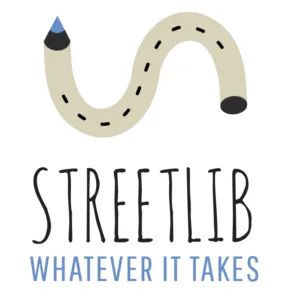
Anne-Catherine de Fombelle helps indie authors focus on the less obvious markets to reach more readers
Looking at the indie publishing community these days, it seems authors can be split in two groups: the “going wide” group, and the others who prefer betting on one outlet (the most relevant) for their book. Anne-Catherine de Fombelle, Chief Globalization Officer for self-publishing aggregator StreetLib, a valued ALLI Partner Member, probes the concept of “the forgotten markets” that can be reached by going wide.

(Graphic by Marta D'Asaro, StreetLib Art Director)

StreetLib is an innovative, growing aggregator helping indie authors reach more readers worldwide including forgotten markets
If you have been following StreetLib’s activities and global vision in the past years, you know we are all about going wide. We still firmly believe that getting your books out there, in as many places and formats as possible, will only help to increase your readership. And this opinion seems to be shared by a lot of indie authors who do just that. With this post, I want to make sure that you aren’t missing out on any markets, formats or outlets where your book could be found and bought.
Going wide isn’t just about the major US and UK stores: there are readers in every corner of the world.
In 2017, we sold books in more than 180 countries and territories.
From Costa Rica to Congo, and the Faroe Islands to French Polynesia, there is no limit as to where your next reader could be.
Look Further Afield to Forgotten Markets…
Another initiative of our founder Antonio Tombolini was The New Publishing Standard (TNPS), which aims to give a truly international vision of the publishing landscape.
“In stark contrast to 2007, when analogue publishing and analogue infotainment prevailed, today there are very few places in the world where publishers cannot reach consumers, engage with consumers, and yes, make money, if they are willing to go the extra mile.”
Mark Williams, TNPS editor-in-chief and international publishing expert.
Thanks to Mark’s work, even I have had my eyes opened to the size of publishing markets in countries like Nigeria, Sri Lanka and Singapore.
Surprising Site for the World's Biggest Book Fair
Did you know, for example, that the biggest book fair in the world take places in Cairo, Egypt? This year, it saw over four million visitors pass through its doors.
To put that into perspective, it’s 160 times more than the London Book Fair (25,000 attendees in 2018) and 13 times more than the Frankfurt Book Fair (slightly over 280,000 attendees in 2017).
Widening your reach starts with widening your vision. Thanks to TNPS and other media, you can get a full overview of the global publishing market.
The internet is breaking down the distribution borders, but it’s our responsibility to go see what lies beyond them and make the most of these new possibilities.
Go Further…
Having a more global outlook of our publishing world is a good start, but you’ll still need to figure out how to reach these new targets. Wide distribution is getting easier everyday thanks to aggregators like StreetLib, who will put your books in thousands of different online stores, libraries, subscription services and any other place where books are sold and who are willing to help us to spread our catalog.
There are various aggregators like us out there, and most of them don’t have exclusivity clauses. This means that by taking your time to choose each one’s unique outlets, you can reach the largest possible number of stores.
Of course, this can make things a bit more complex to manage. If you’re looking for an easy solution, I’d say pick the aggregator with the widest selection of outlets and which continues to explore new markets. No surprises for guessing who tops the list in both these categories: StreetLib. However, I always urge you to do your own research and make your own decision.
Every aggregator has its own merits and only you know what’s best for you. Just be sure to keep your vision wide.
Avoid Focusing on Home
When selling your book globally, you must also make sure your marketing efforts aren’t too focused on your own country. This is tricky, but is helped tremendously by technology and social media.
The first step is to find your book’s audience in different areas of the world. Forums, Facebook groups and Twitter lists and conversations will help with that.
Of course, getting your book translated is also a huge step towards widening your book’s reach and readership. Finding a translator can be difficult, but there will always be other indie authors to give you recommendations. The ALLi member forum (one of many privileges of ALLi members) on Facebook is a good starting point.
If you are wondering which languages you should translate into, it all depends on what languages the readers you’ll reach speak. For instance, if you are distributing with StreetLib, our outlets cover all sorts of countries, but primarily reach Italy (where we were born), English-speaking countries, Spanish-speaking countries and Germany (the whole DACH actually). So these would be the languages to consider.
Go Glocal
Sometimes going further means looking closer. Spreading your book online to exotic countries is great, but did you also think of all the places you could spread your book locally? Not only knocking on the doors of local bookstores if you have printed copies of your book, but also being part of local artist events, organizing your own book shows, etc.
You can also visit local stores (not necessarily bookshops) with websites and ask if they’d be interested in adding ebooks to their catalog and earning royalties. It can be a great opportunity for them to promote local authors and thus gain visibility. Some might actually offer to lend or rent shelf space for you to showcase your books!
There is never a good reason to pass up an opportunity to sell your book, so be sure to explore every channel!
The funnel effect will operate naturally.
Go Direct
By the way, are you selling your own books? Selling direct does not only mean going glocal, but also means earning more royalties per book. Handing out a business card with your website on it is worthless if visitors who want to buy your book then have to go elsewhere to do so.
Once again, there are plenty of solutions for selling your book on your website. For example, StreetLib has developed StreetLib Sell. It follows our usual “no upfront cost” philosophy and makes it easy for you to create a widget, page or full bookstore to sell your books (as well as any other books from our catalog).
To conclude, I’d say the most important thing to do as authors in today’s publishing landscape is to open our eyes to all the possibilities out there. Get a real sense of the world of books and rid ourselves of those preconceived ideas.
Let’s continue to research and learn. It’ll only help us grow!
OVER TO YOU If you have case studies of how StreetLib has helped you reach more readers, we'd love to hear about them. Also please feel free to share any other great advice to add to Anne-Catherine's!
How to Reach Forgotten Markets for Self-published Books Share on XOTHER POSTS ABOUT GOING WIDE
From the ALLi Author Advice Center Archive




Glad to hear from you.
Sounds insane but worth trying!
I’m curious about the use of the word “royalties” in the context of self-publishing. Isn’t that a kind vestige from traditional publishing, where royalties were paid to authors for allowing the publishers to sell their books. With self-publishing, authors become publishers selling their own books! They are selling a product and being paid for it.
Strictly speaking you are absolutely correct, Phyllis. But this is the term the big retailers themselves use, and has become accepted practice.
Used simply to summarise the return an author receives on each book its is pretty clear what is meant.
Where it becomes misleading and perhaps disingenuous is where some compare the Amazon 70% self-publishing royalty to the much smaller royalty paid out by actual publishers to their client authors.
Very interesting and informative article.
But I can’t tell if a statement refers to Ebooks, or both Ebooks and Print.
And I can’t tell if you are referring to Fiction, or both Fiction and Non Fiction.
It would help to distinguish.
Michael Hi!
It refers to all of the above. All this is true for any book format or category. Of course, it’ll be easier to have an eBook spread wider, just because the printing facilities aren’t necessarily present or easy to reach everywhere.
Just to illustrate what Anne-Catherine is saying, in 2018 there are FOUR BILLION people connecting to the internet around the world.
As indie authors we naturally focus on the US and UK. As indie authors we focus on ebooks.
So consider this: The US and UK together make up less than 10% of the world’s internet users.
Over 90% of the world’s internet users – by definition people accessing a device they could be reading our ebooks on — do not live in the US or UK.
And no, they are not all in China.
India has 150 million more people online than the USA has. 462 million, and that’s about to expand massively.
Africa has more people online than the USA has, There are 453 million Africans online.
The European Union has more people online than the USA has. 433 million. If we take the entirety of Europe (inc. Russia) that number rises dramatically. Try 704 million.
Latin America has more people online than the USA. 417 million.
The USA? Just 312 million internet users.
The UK? Just 63 million.
And to put that in context, Brazil (149m), Indonesia (140m), Russia (109m), Nigeria (98m), Mexico(85m), Bangladesh (80m), Philippines (67m) and Vietnam (64m) all have more people online than the UK.
The global book market was with $149 billion in 2017. Less than 30% of that is the USA.
The global book market. It’s so much bigger than you think.